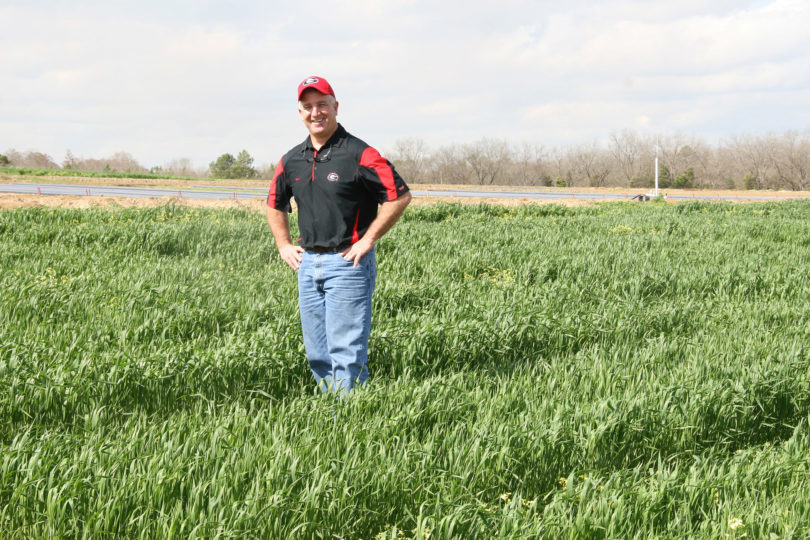When Eric Prostko was growing up in the Northeast, he initially was exposed to agriculture during frequent visits to the small farm of a childhood friend. During college, Prostko had the opportunity to work on a small row-crop/vegetable farm where he was introduced to basic agriculture and farming principles. It was during that time that Prostko was inspired to set out on a path that would lead him right to the heart of the agricultural industry.
After receiving his master’s degree in agronomy/weed science, he took his first job as a county extension agent where he worked for five years before going back to school to earn his doctorate and become an extension specialist. Today, Prostko is a professor and extension weed specialist in the crop and soil sciences department where he is responsible for the statewide weed science programs in field corn, peanut, soybean, sunflower, grain sorghum and canola. In short, he is the primary person in Georgia responsible for making sure growers know how to manage their weeds in these crops.
In recognition of his work, Prostko has been named the 2015 recipient of the Walter Barnard Hill Fellow Award presented each year by the Office of the Vice President for Public Service and Outreach. The Hill Fellow Award is UGA’s highest award in public service and outreach, recognizing sustained, distinguished achievement and contributions to improving the quality of life in Georgia or elsewhere.
“Eric is recognized as one of the leading experts, both regionally and nationally, in his field,” said Don Shilling, head of the crop and soil sciences department in the College of Agricultural and Environmental Sciences. “Collectively, his research and extension programs have an annual estimated impact of more than $64 million in Georgia.”
As a former county extension agent, Prostko deeply is committed to the county delivery system. In his role, he takes university research and delivers that information to the general public-in his case, through Georgia county extension agents. Whether it is through in-service training programs, educational programs or county production meetings, his goal is to make sure he’s extending the information to the people who need it and can benefit from it most.
“I feel as though my primary responsibility is serving as a resource person for our county extension agents,” Prostko said. “My main role is to respond to their questions and look to the future to see what potential problems might be on the horizon and have those answers before they develop.”
Right now, Prostko said the biggest issue he sees in his field nationally is herbicide resistant weeds—specifically in Georgia, Palmer amaranth, which is a type of pigweed.
“Weeds are a huge problem for crops, and most growers spend a large portion of their money on weed control,” Prostko said. “We’ve been working on the resistant weed issue for the past 10 years and are slightly ahead of the game compared to other states. So we frequently get requests to visit other locations and share our knowledge about how we’re managing herbicide resistant weeds and what growers in other areas might be able to do if they’re not doing it now.”
Prostko said at the end of the day, what they are really trying to do is solve problems and develop information that keeps Georgia growers profitable. And to do that, county agents must have the most up-to-date information available.
“I am in a unique position because instead of reading the information from somebody else, I’m living it,” Prostko said. “I’m the person who actually collected the data or sprayed the plot, or I was driving the tractor or whatever it might be.”
Prostko currently is preparing for the spring and summer months where he primarily will conduct research trials in the field. He’s also focused on making sure the state’s newest and youngest agents are properly trained and ready to address any issue that might come their way.





